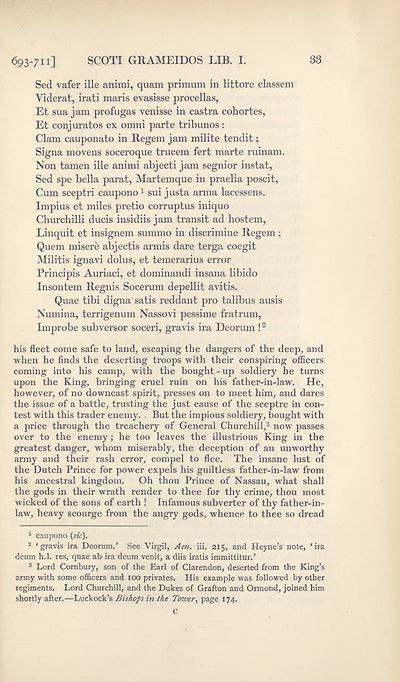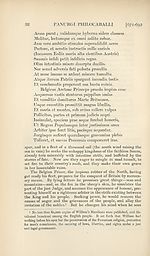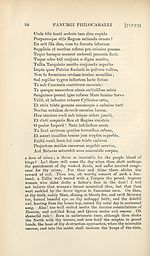Series 1 > Grameid: an heroic poem descriptive of the campaign of Viscount Dundee in 1689, and other pieces
(104) Page 33
Download files
Complete book:
Individual page:
Thumbnail gallery: Grid view | List view

33
693-711] SCOTT GRAMEIDOS LIB. I.
Sed vafer ille animi, quam primum in littore classem
Viderat, irati maris evasisse procellas,
Et sua jam profugas venisse in castra cohortes,
Et conjuratos ex omni parte tribunes:
Clam cauponato in Regem jam milite tendit;
Signa movens soceroque trucem fert marte ruinam.
Non tamen ille animi abjecti jam segnior instat,
Sed spe bella parat, Martemque in praelia poscit,
Cum sceptri caupono1 sui justa arma lacessens.
Impius et miles pretio corruptus iniquo
Churchilli ducis insidiis jam transit ad hostem,
Linquit et insignem summo in discrimine Regem ;
Quern misere abjectis armis dare terga coegit
Militis ignavi dolus, et temerarius error
Principis Auriaci, et dominandi insana libido
Insontem Regnis Socerum depellit avitis.
Quae tibi digna satis reddant pro talibus ausis
Numina, terrigenum Nassovi pessime fratrum,
Improbe subversor soceri, gravis ira Deorum !2
his fleet come safe to land, escaping the dangers of the deep, and
when he finds the deserting troops with their conspiring officers
coming into his camp, with the bought-up soldiery he turns
upon the King, bringing cruel ruin on his father-in-law. He,
however, of no downcast spirit, presses on to meet him, and dares
the issue of a battle, trusting the just cause of the sceptre in con¬
test with this trader enemy. . But the impious soldiery, bought with
a price through the treachery of General Churchill,3 now passes
over to the enemy; he too leaves the illustrious King in the
greatest danger, whom miserably, the deception of an unworthy
army and their rash error, compel to flee. The insane lust of
the Dutch Prince for power expels his guiltless father-in-law from
his ancestral kingdom. Oh thou Prince of Nassau, what shall
the gods in their wrath render to thee for thy crime, thou most
wicked of the sons of earth ! Infamous subverter of thy father-in-
law, heavy scourge from the angry gods, whence to thee so dread
1 caupono (sit:).
2 ‘gravis ira Deorum.’ See Virgil, iii. 215, and Heyne’s note, ‘ira
deum h.l. res, quae ab ira deum venit, a diis iratis immittitur.’
3 Lord Combury, son of the Earl of Clarendon, deserted from the King’s
army with some officers and 100 privates. His example was followed by other
regiments. Lord Churchill, and the Dukes of Grafton and Ormond, joined him
shortly after.—Luckock’s Bishops in the Tomer, page 174.
693-711] SCOTT GRAMEIDOS LIB. I.
Sed vafer ille animi, quam primum in littore classem
Viderat, irati maris evasisse procellas,
Et sua jam profugas venisse in castra cohortes,
Et conjuratos ex omni parte tribunes:
Clam cauponato in Regem jam milite tendit;
Signa movens soceroque trucem fert marte ruinam.
Non tamen ille animi abjecti jam segnior instat,
Sed spe bella parat, Martemque in praelia poscit,
Cum sceptri caupono1 sui justa arma lacessens.
Impius et miles pretio corruptus iniquo
Churchilli ducis insidiis jam transit ad hostem,
Linquit et insignem summo in discrimine Regem ;
Quern misere abjectis armis dare terga coegit
Militis ignavi dolus, et temerarius error
Principis Auriaci, et dominandi insana libido
Insontem Regnis Socerum depellit avitis.
Quae tibi digna satis reddant pro talibus ausis
Numina, terrigenum Nassovi pessime fratrum,
Improbe subversor soceri, gravis ira Deorum !2
his fleet come safe to land, escaping the dangers of the deep, and
when he finds the deserting troops with their conspiring officers
coming into his camp, with the bought-up soldiery he turns
upon the King, bringing cruel ruin on his father-in-law. He,
however, of no downcast spirit, presses on to meet him, and dares
the issue of a battle, trusting the just cause of the sceptre in con¬
test with this trader enemy. . But the impious soldiery, bought with
a price through the treachery of General Churchill,3 now passes
over to the enemy; he too leaves the illustrious King in the
greatest danger, whom miserably, the deception of an unworthy
army and their rash error, compel to flee. The insane lust of
the Dutch Prince for power expels his guiltless father-in-law from
his ancestral kingdom. Oh thou Prince of Nassau, what shall
the gods in their wrath render to thee for thy crime, thou most
wicked of the sons of earth ! Infamous subverter of thy father-in-
law, heavy scourge from the angry gods, whence to thee so dread
1 caupono (sit:).
2 ‘gravis ira Deorum.’ See Virgil, iii. 215, and Heyne’s note, ‘ira
deum h.l. res, quae ab ira deum venit, a diis iratis immittitur.’
3 Lord Combury, son of the Earl of Clarendon, deserted from the King’s
army with some officers and 100 privates. His example was followed by other
regiments. Lord Churchill, and the Dukes of Grafton and Ormond, joined him
shortly after.—Luckock’s Bishops in the Tomer, page 174.
Set display mode to:
![]() Universal Viewer |
Universal Viewer | ![]() Mirador |
Large image | Transcription
Mirador |
Large image | Transcription
Images and transcriptions on this page, including medium image downloads, may be used under the Creative Commons Attribution 4.0 International Licence unless otherwise stated. ![]()
| Scottish History Society volumes > Series 1 > Grameid: an heroic poem descriptive of the campaign of Viscount Dundee in 1689, and other pieces > (104) Page 33 |
|---|
| Permanent URL | https://digital.nls.uk/126596805 |
|---|
| Attribution and copyright: |
|
|---|
| Description | Over 180 volumes, published by the Scottish History Society, containing original sources on Scotland's history and people. With a wide range of subjects, the books collectively cover all periods from the 12th to 20th centuries, and reflect changing trends in Scottish history. Sources are accompanied by scholarly interpretation, references and bibliographies. Volumes are usually published annually, and more digitised volumes will be added as they become available. |
|---|


